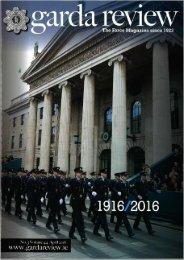Conference Report 2016
Table of contents contains links on page 5. It can be used to skip through chapters.
Table of contents contains links on page 5. It can be used to skip through chapters.
You also want an ePaper? Increase the reach of your titles
YUMPU automatically turns print PDFs into web optimized ePapers that Google loves.
Section 1: Pay and Allowances<br />
6.4 Garda pay was underfunded in the subsequent<br />
benchmarking processes. This resulted in<br />
widespread resentment, as our members<br />
contended that they were being singled out due to<br />
an inability to strike or to take limited industrial<br />
action. This was the discriminatory treatment meted<br />
out to this Association by being effectively and<br />
persistently sidelined from the social partnership,<br />
pay talks and negotiation process. The experience<br />
of being corralled into a side room and presented<br />
with an agreed deal (concluded with the ICTUaffiliated<br />
unions in an adjoining room) was neither<br />
edifying nor equitable. As a result this Association<br />
repeatedly refused to sign-off on such deals.<br />
6.5 The industrial relations temperature in An Garda<br />
Síochána was increased in 2005, through the Garda<br />
Síochána Act. Under Section 59 it is held that:<br />
“a person is guilty of an offence if he or she induces,<br />
or does any act calculated to induce, any member of<br />
the Garda Síochána to withhold his or her services<br />
or to commit a breach of discipline”.<br />
6.6 We also had the breakdown of pay talks in 2009<br />
that led to the GRA surveying members for industrial<br />
action leading to the Croke Park Agreement in 2010;<br />
subsequently the placard protests and Tallaght<br />
‘Basketball Stadium” Rally that undermined the<br />
attempted Croke Park II and resulted in Haddington<br />
Road Agreement. Let us be reminded that this<br />
Review is part of that dispute resolution, and yet<br />
government pushed ahead with the Lansdowne<br />
Road Agreement before this aspect had been<br />
addressed.<br />
6.7 At the Irish Congress of Trade Unions (ICTU)<br />
conference in 2004 delegates voted in favour of an<br />
amendment to their constitution, enabling the Garda<br />
(and Defence Forces) associations to become<br />
associate members of Congress. However,<br />
subsequent initiatives endeavoured to ensure that<br />
representative bodies in An Garda Síochána would<br />
be forbidden from formal ongoing affiliations with<br />
trade unions (i.e. non-membership of ICTU). Section<br />
18(2) of the 2005 Garda Síochána Act states:<br />
“An association established under subsection (1)<br />
must be independent of and not associated with<br />
any body or person outside the Garda Síochána, but<br />
it may employ persons who are not members of the<br />
Garda Síochána.”<br />
6.8 Serving to further tighten the restrictions on this<br />
Association, Section 18(4) of the Act states that:<br />
“...if a question arises whether any body or<br />
association is a trade union or association referred<br />
to in subsection (3), the question shall be<br />
determined by the Minister whose determination<br />
shall be final.”<br />
6.9 In 2009 the relevance of this enactment surfaced<br />
when this Association’s Central Executive<br />
Committee, in frustration at their ongoing exclusion<br />
from the key national decision making forum and<br />
processes, considered the possibility of balloting<br />
the membership on a menu of industrial action<br />
options. This raised a range of possibilities,<br />
including the spectre of the Association’s<br />
leadership being prosecuted or imprisoned.<br />
6.10 A consequential development in the industrial<br />
relations system in An Garda Síochána has been<br />
from the European Committee of Social Rights,<br />
operating under the auspices of the Council of<br />
Europe. Like the European Court of Human Rights,<br />
which is also part of the Council of Europe, the<br />
Committee’s rulings are binding in law. Decisions of<br />
the Committee are final and legally binding and do<br />
not have to be endorsed by any other body. Courts<br />
can declare invalid or set aside domestic legislation<br />
if it is contrary to a decision of the Committee (e.g.<br />
the Garda Síochána Act 2005).<br />
6.11 The complaint brought was that the Irish<br />
Government had violated certain elements of the<br />
European Social Charter, which it had signed up to<br />
(in November 2000) and focused on the fact that<br />
representative bodies in An Garda Síochána:<br />
“...do not enjoy full trade union rights, which include,<br />
in particular, the right to join an umbrella<br />
organisation and the right to bargain collectively”.<br />
6.12 Specifically it was contended that existing<br />
provisions violate Articles 5 (the right to organise), 6<br />
(the right to bargain collectively) and 21 (the right to<br />
information and consultation) of the European<br />
Social Charter. The charter provides:<br />
(a) Join the ICTU<br />
(b) Access the services of the LRC<br />
(c) Take collective industrial action.<br />
6.13 Notably, the Committee’s findings weighed heavily<br />
in favour of gardaí. The GRA sees both scope and<br />
merit in enabling its access to the State’s third party<br />
dispute resolution mechanisms.<br />
38th Annual Delegate <strong>Conference</strong><br />
41




